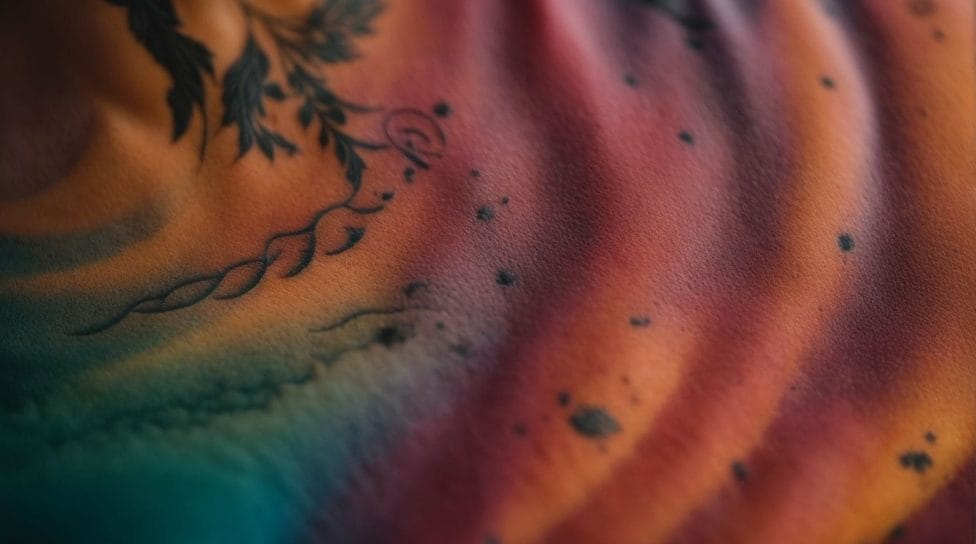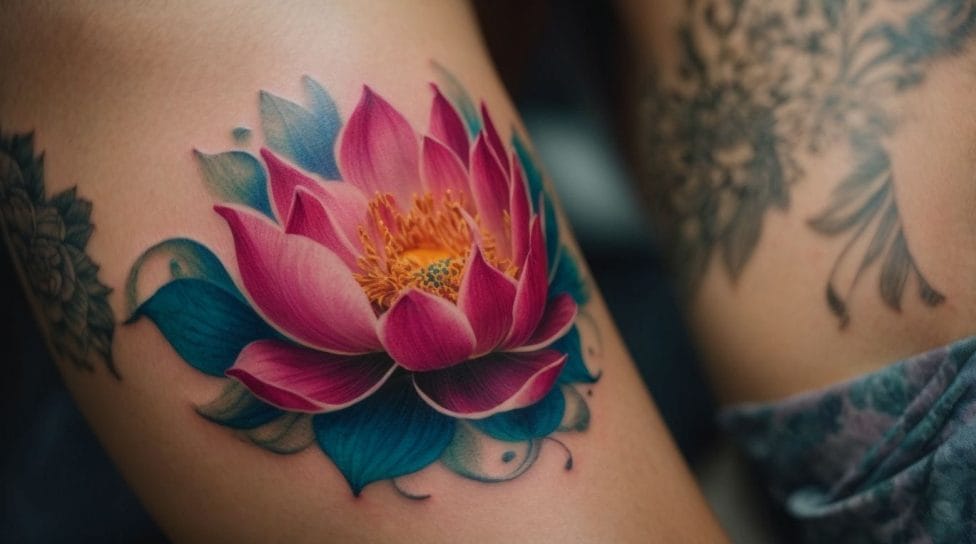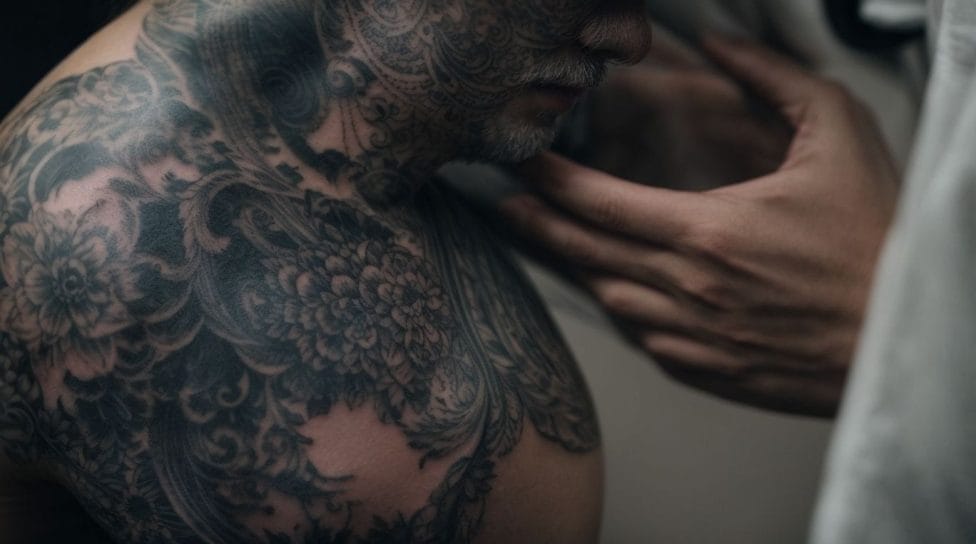Table of Contents
Add a header to begin generating the table of contents
Tattoos are a form of body art that involve inserting ink into the dermis layer of the skin. However, over time, tattoos may naturally fade in appearance. Understanding the factors that contribute to tattoo fading and taking preventive measures can help maintain the longevity and vibrancy of your tattoos.
Several factors can cause tattoos to fade:


By diligently following these aftercare tips, you can contribute to maintaining the vibrancy and longevity of your tattoo.


- Sun Exposure: Excessive sun exposure, especially without protection, can lead to the breakdown of tattoo ink pigments, resulting in fading.
- Aging: As we age, the skin undergoes natural changes, such as decreased collagen production, which can affect the appearance and color of tattoos.
- Tattoo Placement: The location of the tattoo on the body can influence the rate of fading. Areas that experience constant friction or are exposed to rubbing clothing tend to fade faster.
- Low-Quality Ink: Using inferior quality ink during the tattooing process can cause the colors to fade more quickly.
- Poor Aftercare: Inadequate care during the healing process, such as not keeping the tattoo clean or moisturized, can contribute to fading.
- Excessive Exfoliation: Harsh exfoliation or scrubbing over the tattooed area can cause the ink to fade prematurely.
- Use Sunscreen: Applying a broad-spectrum sunscreen with a high SPF to your tattoos can protect them from the damaging effects of UV rays.
- Moisturize Regularly: Keeping the skin moisturized can help maintain the integrity of the tattoo’s colors.
- Avoid Excessive Scrubbing: Gentle cleansing and avoiding harsh exfoliation can prevent unnecessary fading.
- Choose a Skilled Tattoo Artist: A skilled and experienced tattoo artist who uses quality ink can ensure a longer-lasting tattoo.
Key takeaways:
- Tattoos fade over time: Sun exposure, aging, and tattoo placement all contribute to the fading of tattoos. Understanding these factors can help you take better care of your tattoos and delay the fading process.
- Factors that accelerate tattoo fading: Low-quality ink, poor aftercare, and excessive exfoliation can all speed up the fading process of tattoos. Taking proper care of your tattoo can help prevent premature fading.
- Tips to prevent tattoo fading: Using sunscreen, moisturizing regularly, avoiding excessive scrubbing, and choosing a skilled tattoo artist are all effective ways to prevent tattoo fading. These measures can help maintain the vibrancy and longevity of your tattoos.
What Causes Tattoos to Fade?

Photo Credits: Tattooineplanet.Com by Ronald White
Curious about the reasons why tattoos fade over time? Let’s dive into the fascinating world of tattoo longevity and explore the factors that contribute to their eventual fading. From the role of sun exposure and the impact of aging to the influence of tattoo placement, we’ll uncover the secrets behind the gradual transformation of these vibrant body artworks. Get ready to discover the science and artistry behind tattoo fading!The Role of Sun Exposure
The role of sun exposure is highly significant when it comes to the fading of tattoos. The harmful UV rays emitted by the sun have the ability to break down the pigments present in the skin, which ultimately leads to the gradual fading of tattoos over a period of time. In order to safeguard your tattoos from sun exposure, it is crucial to apply sunscreen with a high SPF. Regular and consistent use of sunscreen can effectively prevent fading and maintain the vibrancy of your tattoos for a longer duration. Additionally, opting for protective clothing or seeking shade can also help minimize the adverse effects of sun exposure on your tattoos. It is imperative to remember to ensure the proper care of your tattoos in order to enhance their longevity and preserve their color.The Impact of Aging
As tattoos age, they naturally fade over time due to several factors, including the impact of aging on the skin. The skin’s natural regeneration process causes the ink particles to break down and disperse, leading to a lighter appearance. The loss of collagen and elastin in the skin can contribute to tattoo fading. While it’s impossible to completely prevent the fading process, there are steps you can take to slow it down. Using sunscreen daily, moisturizing regularly, and avoiding excessive scrubbing can help preserve the vibrancy of your tattoos. Choosing a skilled tattoo artist who uses high-quality ink can also make a difference in the longevity of your tattoo.The Effect of Tattoo Placement
Tattoo placement has a significant effect on the fading process. Areas such as the arms, shoulders, and legs, which are frequently exposed to the sun, are more prone to fading due to sun exposure. Additionally, tattoos on hands or feet, which constantly move or rub against clothing, may cause them to fade faster. Conversely, tattoos placed on areas with less sun exposure, like the chest or back, tend to fade at a slower rate. Considering the effect of tattoo placement is crucial for maintaining the longevity and vibrancy of your tattoo. A well-known example highlighting the significance of tattoo placement is the story of British explorer Captain James Cook. During his 18th-century voyages, he observed that Polynesians had intricate tattoos on their extremities. Based on this observation, he theorized that the further the tattoo was from the core of the body, the higher the pain tolerance of the individual. This belief led to the popular notion that tattoos on extremities are more painful. However, modern science has disproven this theory, stating that pain perception varies among individuals regardless of tattoo placement.Factors That Can Accelerate Tattoo Fading

Photo Credits: Tattooineplanet.Com by Sean Lopez
Tattoos are a form of self-expression that can hold personal meaning and significance. Over time, various factors can lead to their inevitable fading. In this section, we’ll uncover the reasons behind tattoo fading and how certain elements can accelerate this process. We’ll explore the impact of factors such as low-quality ink, inadequate aftercare, and excessive exfoliation. So, if you’re curious to understand why tattoos fade and how to preserve their vibrancy, stick around for some enlightening insights.Low-Quality Ink
When it comes to tattoo fading, the quality of ink used plays a crucial role. The use of low-quality ink can significantly expedite the fading process of tattoos. Here are several explanations for this phenomenon:- Inferior Pigments: Low-quality ink may contain substandard pigments that fade at a faster rate over time, resulting in a lackluster and faded tattoo.
- Lack of Color Stability: These inks often lack color stability, causing the tattoo to fade unevenly and lose its original vibrancy.
- Low Pigment Density: Insufficient pigmentation in the ink can produce a tattoo that appears light and washed out, making it more susceptible to fading.
- Poor Ink Adhesion: Low-quality ink may not adhere well to the skin, leading to premature pigment loss and accelerated fading.
Poor Aftercare
Poor aftercare is a significant factor that can accelerate tattoo fading. To ensure the longevity of your ink, it’s crucial to adhere to proper aftercare practices. Here is a list of aftercare tips aimed at preventing tattoo fading:| – During the healing process, make sure to keep the tattoo clean and dry. |
| – To keep the skin hydrated, apply a thin layer of tattoo-specific ointment or moisturizer. |
| – Refrain from picking or scratching the tattoo, as it can harm the healing skin and result in color loss. |
| – Shield the tattoo from excessive sun exposure by applying sunscreen with a high SPF. |
| – Until the tattoo is fully healed, avoid soaking it in water, such as swimming pools or hot tubs. |
Excessive Exfoliation
Excessive exfoliation can speed up the fading process of tattoos. When the skin is vigorously scrubbed or exfoliated, it can remove the outer layer of skin cells, along with the particles of tattoo ink. This can lead to faster fading of the tattoo over time. To preserve the color and clarity of your tattoo, it is crucial to avoid excessive exfoliation in the tattooed area. Instead, opt for gentle exfoliation methods and steer clear of abrasive scrubs or harsh chemicals. Proper aftercare practices, such as regular moisturizing and avoidance of harsh treatments, can help maintain the integrity of your tattoo and minimize fading.How to Prevent Tattoo Fading?

Photo Credits: Tattooineplanet.Com by Russell Torres
Looking to keep your tattoos vibrant and long-lasting? In this section, we’ll uncover effective strategies to prevent tattoo fading. From the importance of sunscreen to the benefits of regular moisturizing, we’ll dive into the secrets of maintaining your ink’s brilliance. We’ll explore how avoiding excessive scrubbing and entrusting your artwork to a skilled tattoo artist can make all the difference. Prepare to discover practical tips that will help your tattoos defy the sands of time.Use Sunscreen
- To prevent tattoo fading, it is crucial to use sunscreen. Here are the steps to incorporate sunscreen in your tattoo care routine:
- Choose a broad-spectrum sunscreen with a high SPF (at least 30) and use it.
- Apply the sunscreen generously on the tattooed area at least 30 minutes before sun exposure.
- Remember to reapply the sunscreen every two hours or after swimming or excessive sweating.
- Make sure to ensure complete coverage of the tattoo with the sunscreen, including any exposed areas.
- Opt for a water-resistant sunscreen to provide longer-lasting protection.
- Avoid direct sunlight during peak hours when UV rays are the strongest and instead seek shade.
- Consider using clothing or accessories to provide additional sun protection for your tattoo.
Moisturize Regularly
To prevent tattoo fading, it is essential to moisturize regularly. The key to maintaining the vibrancy of your tattoo and preventing it from becoming dull or faded is by keeping your skin well-hydrated. Incorporating regular moisturizing into your tattoo care routine can be done in the following ways:- Select a fragrance-free and gentle tattoo-specific moisturizer.
- After gently cleansing your tattooed area with a mild soap, apply the moisturizer daily.
- Massage the moisturizer into your skin using gentle, circular motions to ensure proper absorption.
- Avoid exposing your tattoo to excessive sunlight or harsh weather conditions, as they can dry out your skin and lead to fading.
- Remember to reapply moisturizer throughout the day, especially if your skin feels dry or itchy.
Avoid Excessive Scrubbing
Excessive scrubbing should be avoided in order to prevent accelerated tattoo fading and skin damage. It is important to refrain from vigorous scrubbing or exfoliating the tattooed area, as this can prematurely remove the ink. Instead, opt for a gentle cleansing routine using mild soap and water, which is sufficient to keep the tattoo clean. Excessive scrubbing can lead to irritation, inflammation, and scarring, ultimately affecting the appearance and longevity of the tattoo. To ensure proper healing and long-lasting results, it is recommended to adopt a gentle approach when cleansing the tattoo and to follow the aftercare instructions provided by your tattoo artist.Choose a Skilled Tattoo Artist
When it comes to getting a tattoo, it is essential to choose a skilled tattoo artist. This decision will greatly impact the longevity and quality of your tattoo.- Experience: One important factor to consider is the artist’s experience. Look for artists who have a proven track record and a portfolio that showcases their skill and versatility.
- Cleanliness: Another crucial aspect is the cleanliness of the artist’s workspace. Make sure they work in a clean and sterile environment, following proper hygiene protocols.
- Style: Finding an artist whose style aligns with your vision is vital. This will ensure that they can execute the design you want with precision.
- Communication: A skilled tattoo artist will actively listen to your ideas, offer suggestions, and maintain clear communication throughout the entire process.
When Do Tattoos Start Fading?

Photo Credits: Tattooineplanet.Com by Vincent Rivera
Tattoos typically start fading over time, but when do tattoos start fading? The rate at which this happens can vary depending on several factors. Tattoo placement, ink quality, sun exposure, and skincare routine all influence the fading process. Tattoos placed on areas exposed to the sun tend to fade faster than those on covered areas. Low-quality ink or inadequate aftercare can also accelerate fading. Generally, tattoos start to fade within the first few months, with noticeable changes becoming more apparent after several years. It’s important to note that each person’s experience may differ based on these factors. True story: My friend got a tattoo on his forearm several years ago. Initially vibrant and sharp, it gradually started fading after about two years. When do tattoos start fading? As he didn’t protect it from the sun, the colors became duller and less defined. Now, he regrets not taking better care of it and wishes he had been more diligent with sun protection.Some Facts About Do Tattoos Fade?
- ✅ Tattoos will naturally fade over time. (Source: Our Team)
- ✅ Factors such as sun exposure, friction, and changes in the skin can accelerate tattoo fading. (Source: Our Team)
- ✅ Certain areas of the body, like the fingers, hands, wrists, and feet, are more prone to tattoo fading. (Source: Our Team)
- ✅ Proper aftercare, including avoiding sun exposure and moisturizing the tattooed area, can help prevent fading. (Source: Our Team)
- ✅ Choosing an experienced tattoo artist and following their aftercare instructions is important for minimizing tattoo fading. (Source: Our Team)


